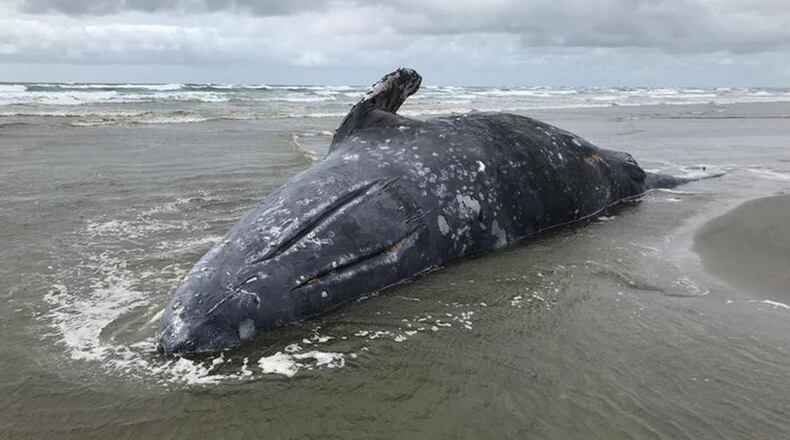Dozens of gray whales have washed ashore up and down the Pacific West Coast from Mexico north to Canada this year, and scientists are trying to figure out what’s killing them.
The National Oceanic and Atmospheric Administration, or NOAA, said 70 gray whales have been found on U.S beaches since January: 37 in California, 25 in Washington, three in Oregon and five in Alaska. The numbers are far higher -- 148 dead gray whales -- when Mexico and Canada are factored in.
Many, but not all, of the whales were malnourished or completely emaciated, NOAA reported.
Gray whales are also appearing in unusual places that they don't usually visit during the annual spring migration from their birthing grounds in Mexico to their feeding grounds in Alaska, according to The Associated Press. They've been spotted in Puget Sound and San Francisco Bay, probably looking for food, and there, they are in great danger from collisions with ships.
When they reach their Arctic hunting grounds, about 5,000 miles away, the mammals have to pack on the pounds in order to make the 5,000-mile trip back to Mexico.
Scientists have two potential theories on why the whales are starving, Smithsonian Magazine reported. The first is that the whale population has reached its natural capacity and its environment can't sustain any more.
“Keep in mind that carrying capacity is not a hard ceiling, but that it’s a shifting threshold,” NOAA biologist David Weller told Reuters. “In some years or period of years, the environment is capable of supporting more whales than in other years.”
The other theory is related to the warming trends in Arctic waters in recent years. Less sea ice could be affecting the amphipod population, the whales’ main food source, meaning they aren’t eating enough to make it to Mexico and back the following spring.
But this isn't the first time a Pacific gray whale die-off has occurred. In 1999 and 2000, more than 100 gray whales washed ashore. Researchers blamed the deaths on a warming weather cycle in the Pacific called an El Nino. In the cases in which the whales were no emaciated, according to ABC News, researchers were not able to determine the exact cause of death.
>> Trending: Dangerous raccoon dogs terrorizing English village after escaping from pen
NOAA called the current gray whale die-off an unusual mortality event or UME, and said it's assembling a team of scientists to review data and determine the next steps.
About the Author
The Latest
Featured


